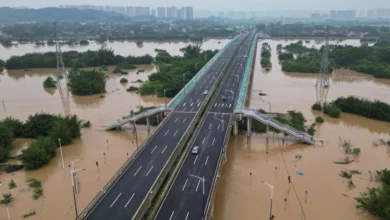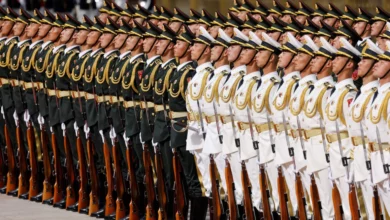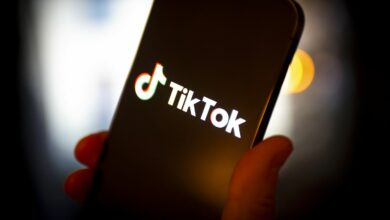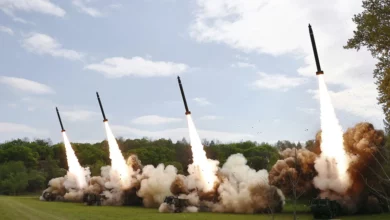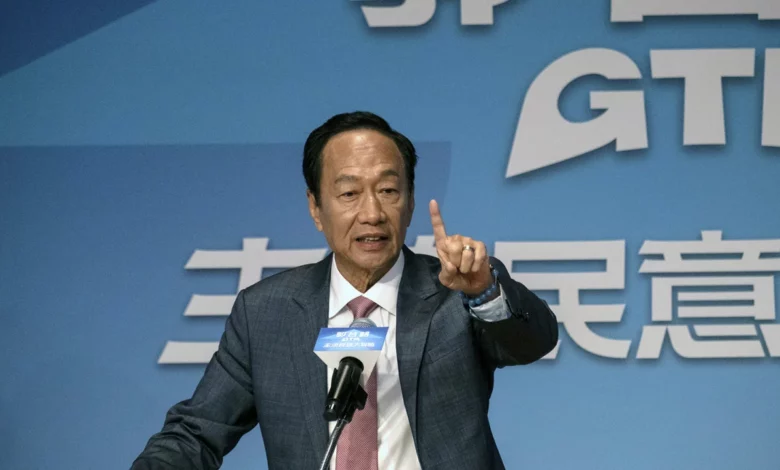
Terry Gou, the founder of the world’s largest iPhone maker Foxconn, announced Monday his second presidential campaign in Taiwan, joining an already crowded China-friendly camp to challenge the independence-leaning Democratic Progressive Party (DPP).
Under incumbent President Tsai Ing-wen, who cannot run due to term limits, the DPP has already held power for eight years. If the party wins a third term, it would be unprecedented in the island’s 27-year of democratic history.
The election, due in January, comes at a particularly fraught moment between the island of 24 million people and its superpower neighbor, China, which claims Taiwan as its own territory to be taken by force if necessary.
Tensions have risen to their highest level in decades, as China’s assertive leader Xi Jinping ramps up military pressure on the island, sending warships and fighter jets across the strait with increasing frequency and scale.
Fears of a Chinese attack have only intensified since Russia’s invasion of Ukraine, which Beijing has persistently refused to condemn, whilst deepening its close relationship with Moscow.
The specter of conflict has not loomed as large over a Taiwan election since 1996, when Beijing fired missiles toward the island to intimidate voters not to support a candidate championing Taiwan’s separate identity from China. (That move backfired spectacularly and the candidate won.)
Amid rising threats of invasion, Taiwan’s foreign policy – especially its relations with China – has become a central issue in the presidential race, alongside more bread and butter subjects like the economy and the rising cost of living.
Opposition candidates, including Gou, blame the DPP for provoking Beijing and stoking tensions, labeling the vote as a choice between war and peace.
Meanwhile, the DPP’s candidate, Vice President Lai Ching-te, has framed the election as a choice between democracy and authoritarianism.
“Don’t be afraid and turn back because of the increased threat from authoritarianism. We must be brave and strong to continue to grow Taiwan on the road of democracy,” he said during a transit through the United States last month, defying Beijing’s condemnation of the trip.
Lai, a Harvard-educated doctor-turned-politician, hails from the so-called “deep green” faction of the DPP – known for its more openly pro-independence leanings.
That has made him a thorn in the side for Beijing, which regularly decried him as a “separatist” and “troublemaker.” In 2017, Lai enraged Chinese officials by calling himself a “pragmatic worker for Taiwanese independence.”
Since winning the DPP nomination, Lai has moderated his stance, saying he supports keeping the cross-strait “status quo” – a choice that has consistently won the majority of public backing in opinion polls, though the island’s younger generation has shown increasing support for formal independence.
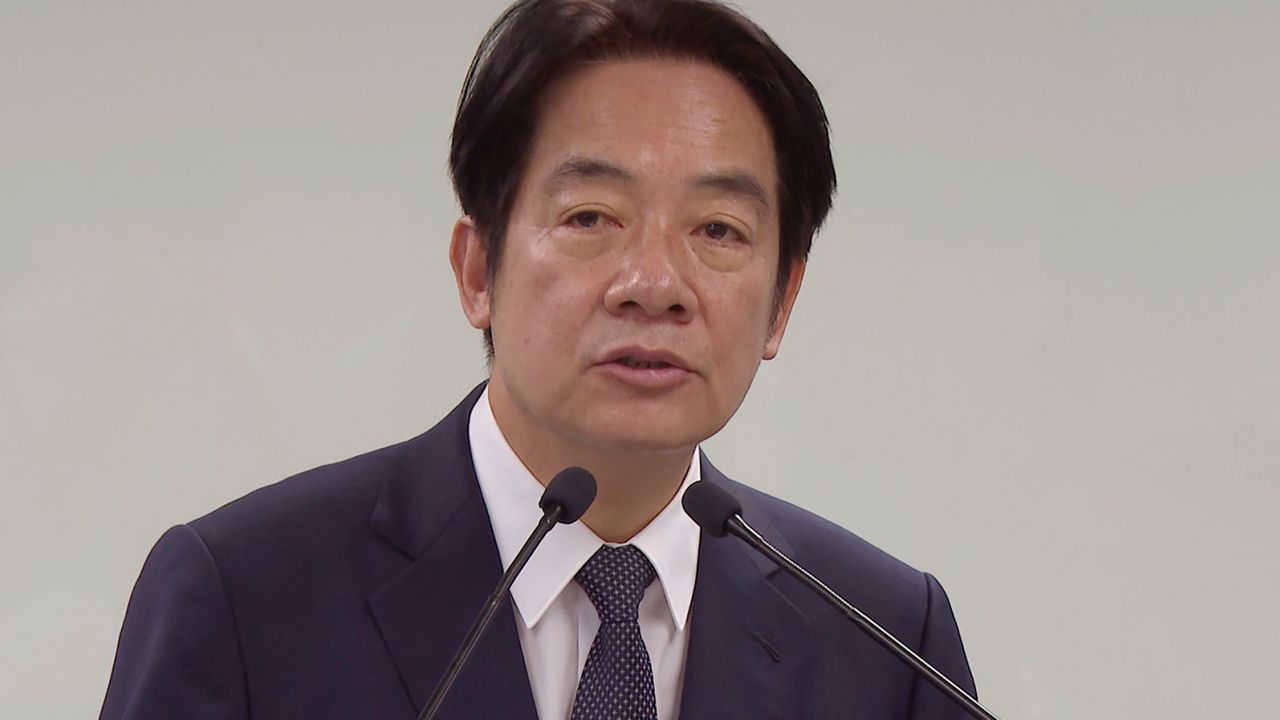
’50 years of peace’
As an independent, Gou must collect about 290,000 signatures by November to get his name on the ballot. He has already held campaign-like rallies around Taiwan in recent months to build support for his candidacy.
His campaign centers on a single message: the only way to avoid a war with China is to get the DPP out of office.
Priding himself on his decades-long experience in handling relations with Chinese officials, Gou advocates for Taiwan to return to a “one-China framework” and start talks with Beijing immediately.
His own business success has stemmed from a thaw in cross-strait relations.
Foxconn set up its first offshore factory in Shenzhen in 1988, and has since played a crucial role in China’s reform and opening by bringing entrepreneurship, capital and technology to the fledgling Chinese economy. The electronics manufacturing giant now has sprawling factories that employ hundreds of thousands of people across China.
The business empire has made Gou one of Taiwan’s richest people with a net worth around US$7 billion – and given him the confidence to make big promises.
Announcing his candidacy Monday, Gou pledged to double Taiwan’s economic growth rate and ensure the island never becomes “the next Ukraine.”
“Give me four years and I promise that I’ll bring 50 years of peace to the Taiwan Strait,” he said.
That is a bold claim to make, even for a businessman historically in the good books of China’s ruling Communist Party. Gou is the only candidate who has met and shaken hands with Xi. In 2014, he was greeted by the Chinese leader at the Diaoyutai State Guesthouse during a trip to Beijing.
But Foxconn’s huge investments in China have also raised suggestions that Gou would be susceptible to Chinese pressure – a notion he has fiercely rejected.
“If the Chinese Communist Party were to say that if you don’t listen to me, I’ll confiscate your assets from Foxconn, I would say: yes, please do it,” Gou said.
He resigned as chairman from Foxconn in 2019 to focus on his first presidential bid, but dropped out of the race after failing to win a nomination from the Kuomintang (KMT), Taiwan’s main opposition party.
Shake up the race
After being rejected by the KMT for a second time earlier this year, Gou is entering the fray as an independent runner, roiling an opposition camp that already has two candidates favoring closer and more stable ties with Beijing.
Hou Yu-ih, the mayor of New Taipei City, is the chosen candidate of the KMT, while Ko Wen-je, a charismatic former mayor of Taipei, is running for the smaller Taiwan People’s Party.
The KMT has expressed “extreme regret” over Gou’s bid and urged him to support Hou, for fear of splitting the Beijing-friendly vote.
But Gou has defended his decision, casting himself as the only one who can unite the fractured opposition against Lai, who’s currently leading in the polls.
“My candidacy is to promote the integration of the opposition camp,” he said on Monday, urging Hou and Ko to come to the table and discuss the best strategy to defeat DPP.
Wen-Ti Sung, a political scientist with the Australia National University’s Taiwan Studies Program, said in the short term, Gou is likely to further divide opposition votes and thereby “giving Lai an easier time.”
But the long-term implications are harder to predict, Sung warned.
Gou’s dream scenario would be to force the other two opposition figures to either drop out or get behind him, so that he could become the sole challenge to Lai, though few analyst in Taiwan believe that’s a realistic vision.
Following Gou’s announcement, Hou, the KMT candidate, told reporters his “attitude towards standing for president has never changed” and that he was concentrating on pressing forward with the mission given by the party.
Ko’s party said it respected Gou’s right to run but was working hard on Ko’s own campaign, Reuters reported.
In addition to securing 290,000 votes before November, Gou also needs to announce his running mate before September 17, as required by Taiwan’s Central Election Commission.
“Gou is really having a race against time, and time is really not in his favor,” Sung said.

